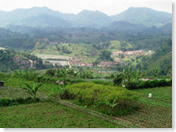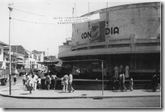During the afternoon in ever increasing numbers, Dutch troops could be seen wandering aimlessly about the street outside. The all looked lost, like sheep without a shepherd. This simile is very accurate. Some of them wandered into the lane at the side of our office premises, having vainly sought food at the Indian restaurant next door. We were fortunately able to provide them with a rough meal, thanks to the provisions we had brought with us, and while they sat on the pavement eating ravenously they told us how they had been somewhere  up north of Lembang for the past three days and that there were no officers anywhere to give them orders. They had received no food supplies and at length bewildered and famished, they had made their way back to Bandoeng.
up north of Lembang for the past three days and that there were no officers anywhere to give them orders. They had received no food supplies and at length bewildered and famished, they had made their way back to Bandoeng.
About 5 pm we decided to go along to the Concordia Club  for a cup of tea although the lounge and terrace were full of khaki or field green clad, mostly weary, figures, there were no 'boys' (waiters) to be seen nor did anything seem to be being served. We all went prospecting in the service regions and eventually found an assistant chef, who informed us the Club was completely sold out of everything eatable and that even hot water was not available owing to the furnaces being blacked out as a result of the mass desertion of all the native staff.
for a cup of tea although the lounge and terrace were full of khaki or field green clad, mostly weary, figures, there were no 'boys' (waiters) to be seen nor did anything seem to be being served. We all went prospecting in the service regions and eventually found an assistant chef, who informed us the Club was completely sold out of everything eatable and that even hot water was not available owing to the furnaces being blacked out as a result of the mass desertion of all the native staff.
It was the same story at all restaurants and cafes and we had perforce to return eventually to the office without having partaken of the cup which at that moment would have cheered more than usual. By this time it was getting dark and as there was nothing to be gained by sitting about in the mosquito invested discomfort of the office, we had a quick scratch meal and for the second night, retired at a ridiculously early hour.
Next morning, Sunday, we discussed the situation once more and finally decided to be fatalistic about the whole business and to return to Dennenlust. We felt we had had enough of discomfort and it was particularly hard on the kiddies and also on Lydia who was expecting her third baby. The Sparkes contingent, when they heard our intention, decided to do likewise, and within a very short time we were again installed in our homes, and revelling once more in the ease of domestic comforts.
But we were not destined to have peace of mind for long. At 11 am General Poorten, Commander in Chief of the Army, broadcast the tragic announcement that capitulation had taken place, and the "the Royal Dutch Indian Army had ceased to exist."
Our feelings on hearing this message can better be imagined than described. We just looked at each other in stunned silence. The rest of the day passed quietly except for the occasional loud hum of the flight of seven silver coloured Jap bombers, their wings prominently displaying the blood red sun symbol of Nippon which circled at intervals above the town. When night fell it was as if the silence of the grave itself had descended on Bandoeng. Inevitably we talked a lot and discussed the situation in an effort to cheer each other up, but all of us, I think, with the exception of the children went to bed with heavy hearts.
Over the radio, during the evening, we had been informed that the Japanese command desired the presence of the municipal authorities, bankers and business men to be held in the Town Hall the following morning at 9 am. Sparkes and I decided we had better attend.
When we arrived at the Town Hall we found that there were already quite a number of Japanese soldiers to be seen there. True to the 'showing off' propensities of the Nip and which we were to observe repeatedly through the next three and a half years various groups were engaged in a sort of spectacular sword play in the grounds of the great delectation of the natives who had collected in hundreds to enjoy this free show. The 'swords' were more like wooden staves with which they made passes at each other each attempting to avoid the onslaught of his opponent by very quick and agile jumps and springs. The whole to an accompaniment of blood curdling yells. The whole business was, of course, just a small instance of the initial workings of the Japanese propaganda machine and expressly designed to impress the native population.
We were about 100 all told at this meeting which took place in the Council Chamber which was a fairly large room fitted out with a raised dias along one side, from which I presume in normal times, the Mayor used to preside over the deliberations of the city fathers. A few of the municipal functionaries appear to be in charge of the preliminaries and we were directed by these gentlemen to chairs set in rows facing the diaz, at the same time being nervously instructed to stand to attention when the Japanese General and his staff arrived.
We had a long time to wait, about an hour and a half, if I remember aright, but sufficiently long to let the feeling of humiliation at this treatment be felt by all present, a feeling which was intensified to the Nth degree when the conquerors at long last deigned to appear.
A more ruffian like, slovenly and barbaric looking bunch of unshaven travesties of the genus homo I had never seen nor hope to see again.
The General himself was the typical Jap of caricature, all teeth and opaque slitty eyes glaring through thick lensed spectacles. There were about then Nips altogether and, with one exception, the others were, in various ways, as repulsive looking as the General. The exception was one who, from the wings on his breast, was evidently the representative of the Air Force. He looked almost clean and almost human.
In spite of the stark tragedy of the situation, I could not help feeling at the time, in a detached sort of way, that this was an historic occasion and that I was privileged to be present on such a momentous occasion.
The proceedings were fairly brief and amounted in effect to the signing of the declaration by the Mayor in which he undertook the responsibility for the general good conduct of the citizenry of Bandoeng while other authorities and business men were instructed to carry on with their duties and businesses as usual in order to ensure normal conditions being maintained in the town.
The General gave his orders in a series of animal like mutters and grunts which were translated and communicated to us in Malay, just the pleasant little way of the Japanese of giving the knife a twist in the wound. We all stood at attention as the General and his staff quitted the Chamber.
The civil authorities broadcast during the morning a request that everyone stay indoors that day as from noon, as the Jap occupational force was expected on the early afternoon.
**** to be continued





1 comment:
This is an important part of history.
Thank you for sharing it to prevent its getting lost in time.
I hope you continue on to Part 2.
Post a Comment